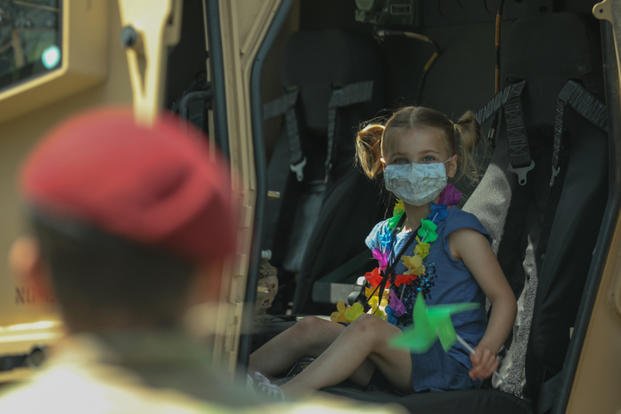Patricia “Patty” Montes Barron is the Deputy Assistant Secretary of Defense for Military Community and Family Policy.
Military children are the very fabric of the military community, and they play an essential role in supporting their parents’ military service. Frequent moves, long separations from parents, and celebrating holidays and milestones away from loved ones are just some challenges faced by military children.
For a moment, imagine always being the new kid at school and feeling like you never quite fit in. Military children can potentially move six to nine times from kindergarten to high school. Imagine knowing your parent might be in danger, thousands of miles away, and trying to go about day-to-day living like everything is fine. Or, one year you’re in a school district where you are the best and brightest at the top of the class, and then, with just one move, suddenly you’re behind.
Military life is a rewarding and challenging adventure – it affords us many amazing moments, but requires a lot of hard work – particularly, for our service members with young children. Being away from them while on deployment or assignment is incredibly tough.
As an Army spouse for more than 30 years with three children of our own, I am intimately familiar with the sacrifice and resilience of our military children. I spent segments of time solo parenting. Our days were busy with schedules and activities, but in the evening, after bath time, the kids were acutely aware of my husband’s absence as we read bedtime stories.
My two older children went to four elementary schools, two middle schools and three high schools. Their military childhood experience impacts them to this day. My youngest had a more stable school experience. All three went on to obtain undergraduate and graduate degrees. I am very proud of them. My daughter served in the military and deployed to Afghanistan, where she met her husband. She is medically retired and is a military spouse – raising our two adorable “military” granddaughters.
Like most children around the globe, the COVID-19 pandemic added even more challenges for our military children. For my granddaughters, the biggest challenge was connecting with other children during COVID restrictions. Military children have done their best to thrive in this difficult environment, but this pandemic has taken a toll on all of us. I would be remiss if I didn’t speak to the critical topic of mental health for our military children.
An example is the lack of pediatric behavioral health specialists. Supporting those who support kids has been a long-standing important resource for the Defense Department. What we know and what our studies tell us is when a military parent feels supported, when their stress is recognized, when there are programs that are easy to access, our children have better outcomes. We must also understand parents with children who have special needs or health issues have felt more isolated during the pandemic.
Supporting our military children during Month of the Military Child is more than just celebrations and purple balloons; it can also mean an opportunity to do a quick scan of your programs and outreach to determine whether they are vehicles to strong positive outcomes and a means for families – especially for the more than 1.6 million military children and youth – to connect and develop strong ties when possible.
Our family relied on the generosity and kindness of our family and military community, and also the community “outside the gates.”
Everyone who touches military children’s lives has a chance to make a difference, to recognize who they are and understand what makes them unique. So many teachers, school leaders, neighbors and community members interact with military children each day. Your understanding and care can be invaluable. A kind word or an invitation to a play date – while these seem like small actions – can be a lifeline to a child.
There are many community partners that – in coordination with the great work of our installation child and youth programs (youth centers, teen centers and child development centers) – already help our military children with ongoing programs, such as the Boys & Girls Clubs of America and 4-H. Encouraging military children to participate in these offerings can be a way we all help, too. We can all come together to help support military children.
So this April, invite a new military child to join your team, ask a new military mom or dad for coffee or just wave “Hi” to a new military neighbor.
Visit the department’s Military OneSource website to learn more about Month of the Military Child events and ways to honor our military children. You can also join the conversation and follow the celebration on the Military OneSource Facebook page.
Keep Up with the Ins and Outs of Military Life
For the latest military news and tips on military family benefits and more, subscribe to Military.com and have the information you need delivered directly to your inbox.



















